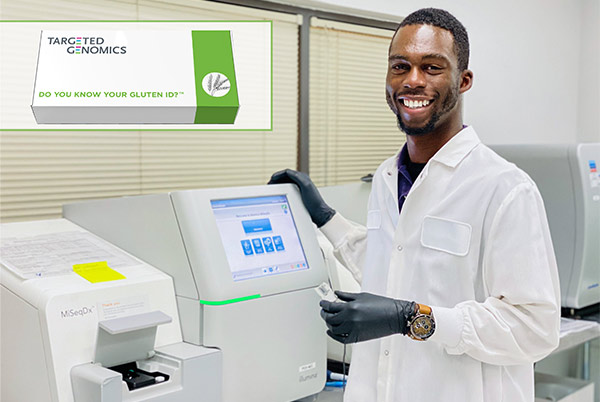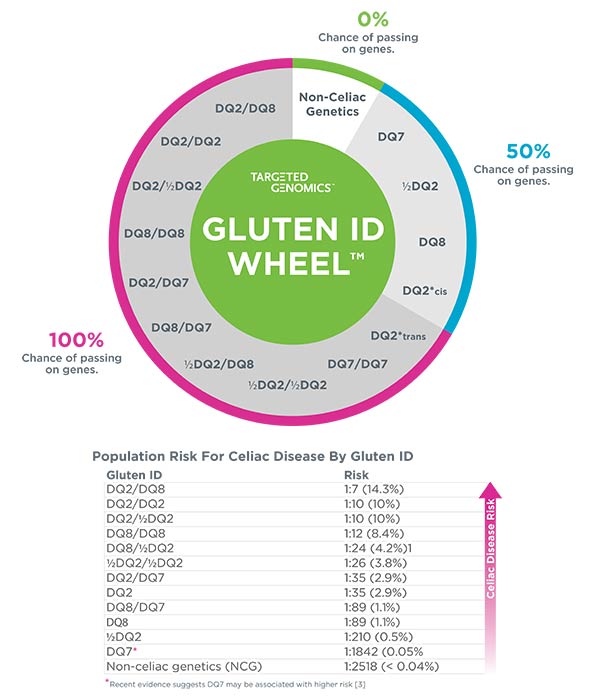
What’s your risk for celiac disease? Find out with Targeted Genomics
Our genes are fascinating. They determine not only simple things like our hair and eye color, but more complex things, like to which diseases we are susceptible. Genes are a huge part of the puzzle, but not the only part. Having a gene for a particular disease does not mean you have the disease. Science has told us that there is a balance between nature (genes) and nurture (environment/lifestyle). A myriad of things, from stress to diet to toxins, can trigger nature to take a particular course. There are ways to help shape your environment and lifestyle to attempt to control the outcome of a disease, but you can’t shape or control your genes. If you can’t change them, what can you do about them? You can learn about them. You can learn what your genes say about you and with that, you can determine your risk for certain diseases and thus, change your lifestyle or be monitored for the development of the disease. Generally speaking, the earlier a disease is caught, the better chance we have to handle it as best we can.
With all that said, let’s discuss genetic testing and familial risk for celiac disease.
Targeted Genomics is a genetic testing company founded by Dr. Shelly Gunn, a board-certified pathologist, Medical Director of the PacificDx clinical laboratory in Irvine, California, and director of the Genomic Pathology division of Precision Pathology Services in San Antonio, Texas. After she and a close friend both were diagnosed with autoimmune conditions and went gluten-free to help ease symptoms, she and her friend determined they needed to learn about their families’ genetics to help gauge risk factors for their family members. Upon finding that no reasonably priced, easy-to-understand tests were available, Dr. Gunn set out to create her own. After five years of development, she was happy with the test they created, and Targeted Genomics began offering at-home testing kits that use a simple cheek swab to run genetic testing for celiac disease risk (“Gluten ID”).
The two genes linked to celiac disease are HLA-DQ2 and HLA-DQ8. You can have either one of these or both, and you can get either one or both from your mother or father. Depending on the combination of genes, your risk level changes (see the chart on the bottom left for details). In general, people with a first-degree relative (parent, sibling, or child) with celiac disease have a 4 to 15 percent chance of developing the condition, whereas the general population has a 1 percent chance of developing celiac disease.

If you already know you have celiac disease, but want to find out your family’s risk for developing it, you can order Gluten ID genetic testing kits. Or, let’s say you know you have gluten sensitivity, but you’ve never ruled out celiac completely – you feel better without gluten – then you can order a genetic testing kit for yourself. With the Gluten ID kit, you can determine if you have risk for developing celiac or not (note: gluten sensitivity can still occur even if you don’t have celiac-specific genes). Additionally, genetic testing allows you to assess your risk without having to eat gluten prior to testing, unlike the blood antibodies and intestinal biopsy methods.
The reason for a genetic test is different for everyone, but the overarching idea is to be better informed and ready to make the best decisions for the health of you and your family.
To learn more about genetic testing and to order your own genetic testing kit from Targeted Genomics, visit: targeted-genomics.com or amazon.com
Use code GLUTEN21 for 10% OFF a testing kit when you order from the company website!



